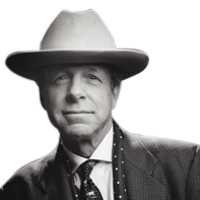“I have decided not to seek re-election for my House seat in 2012 and will focus all of my energy winning the Presidency.” With that one proclamation Tuesday, Rep. Ron Paul of Texas may have changed the game plan for the GOP presidential-primary process.
He’s like a Texas fire ant—a tough little guy with a mighty big sting and an itch that just doesn’t go away. This is Paul’s third run for the White House. He ran as a Republican in 2008 and a Libertarian in 1988.
In his 12th term in Congress, Ron Paul said in his earlier presidential announcement: "Time has come around to the point where the people are agreeing with much of what I've been saying for 30 years, so I think the time is right."
Now chair of the House subcommittee with oversight for the Federal Reserve, his favorite target for criticism, Paul has been the most principled fiscal conservative and most consistent of any politician. He has never voted to raise taxes; he has never voted to approve an unbalanced budget. He does not participate in the congressional pension program; he returns a portion of his budget to the U.S. Treasury every year. And he is often the only representative to cast a "no" vote.

Though his hardline libertarian streak sometimes conflicts with core GOP values, Paul was reelected by his conservative district in 2010 with a whopping 76 percent of the vote. His decision to not seek reelection in the House may have been influenced by the redrawing of his district’s boundaries to accommodate the four House seats gained by Texas, but the opportunity to focus only on his presidential bid is a blessing (for him) and a challenge (for the GOP).
Dismiss them at your peril; his strong libertarian followers—call them Pauliacs or Roniacs—are masters at magnifying their might. In 2008, Paul captured a surprising 10 percent of the caucus vote in Iowa, a third-place finish but just 3 points behind the party’s eventual nominee, Sen. John McCain. And at the Conservative Political Action Conference in February of this year, he won the straw poll vote for the second consecutive year, capturing 30 percent of the vote, 7 points ahead of Mitt Romney.
His grassroots support is not big, but it is intensely loyal. Faded Ron Paul bumper stickers still appear on the highways across the country, along with hand-stenciled “Ron Paul Revolution” posters. Though their runaway enthusiasm borders on boorish, they are masters of the machinations behind the caucus and convention process.
At the Nevada state GOP convention in 2008, Ron Paul supporters drove through a rules change that halted the approval of a preapproved slate of convention delegates in an attempt to substitute their own supporters to travel to the national convention and boost Paul's delegate totals.
Not offered a speaking slot at the Republican convention in 2008, Paul and his Campaign for Liberty hosted a parallel Rally for the Republic convention. Some 10,000 tickets were sold, and the event was broadcast on C-Span. A more focused Paul for President campaign could create real havoc at the 2012 convention, invited or not.
And his repeat wins at CPAC point more to his ability to organize supporters than his appeal to the broader GOP electorate as he lags behind Mitt Romney, Rep. Michele Bachmann, Gov. Rick Perry, Sarah Palin, and Herman Cain in the polls.
But with a more focused Paul, GOP beware. The more you scratch a fire-ant bite, the more the darn thing itches.
McKinnon Electability Index: Rep. Ron Paul
1. Rationale for running: He is the champion of a “limited, constitutional government, low taxes, free markets and a return to sound monetary policies.” * * * *
2. Emotional connection: His followers’ passion is matched only by his detractors’ derision. * *
3. Resonance/relevancy of message: The country is just catching up to his thinking on the economy, but his isolationism and absolute libertarian positions do not resonate with a conservative base. * *
4. Message discipline: When he latches on to a topic, he is unstoppable, but he sometimes wanders too far. * *
5. Candidate preparation: An encyclopedia on the economy. * * *
6. Life experience: U.S. Air Force flight surgeon, OB/GYN in private practice. * * * *
7. Political/government experience: More than 20 years in the U.S. House. * * *
8. Fundraising strength: $4.5 million in second quarter, ahead of Tim Pawlenty, Jon Huntsman, and Herman Cain. He raised $1 million in one day with an online “money bomb.” * * *
9. Base: Devoted and very vocal libertarian base belies its limited size. But a master of the caucus and convention process. *
10. General-election appeal: Limited. His bitter medicine does not attract crossover support. *
Total: 25 of 40 chads.





